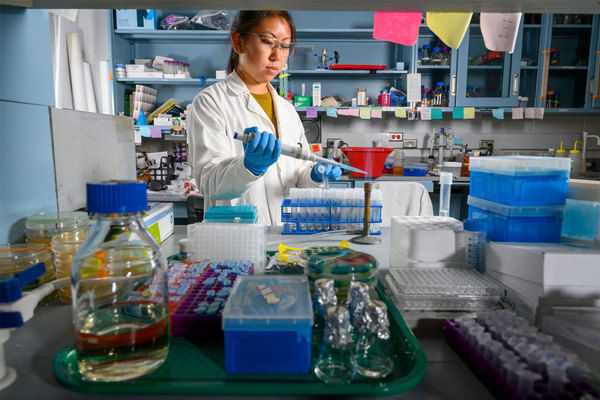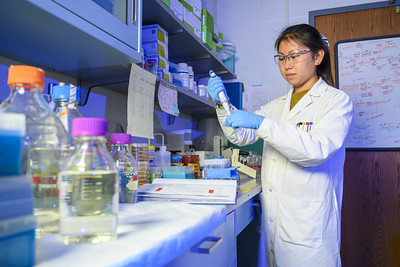
Clare Cahir came to Notre Dame four years ago with the intention of pursuing undergraduate research. After settling into campus for her first semester, she spent the second reaching out to several professors, searching for the right research fit.
She initially contacted biochemistry Professor Matthew Champion, associate professor in the Department of Chemistry and Biochemistry, for information about his lab, but received a surprising response. He emailed back to tell Clare that his wife, Patricia Champion, associate professor in the Department of Biological Sciences, was an alumna of the same small, Catholic, all-female high school in New Jersey that Clare had just graduated from. He suggested that the connection was not a coincidence and that they should work together.
“The odds that I was from the same high school as a PI who was doing research I was interested in was crazy, so from there I just decided to join the lab. This is where I’m supposed to be,” Clare said.
Though Champion teaches in the biological sciences department, and Clare is a chemistry major, she has an interest in tuberculosis. When she was younger, she received a false positive tuberculosis test and was treated for a latent version of the disease. The Champion Lab looks at a secretion system of Mycobacterium tuberculosis to identify its virulence factors, so Clare’s medical history gave her reason to be interested.

During her junior year, Clare worked on a project that was funded by a grant the lab received. She took a break from research during the 2018 spring semester to study abroad in Rome for her supplementary major in Italian. After her time in Italy, Clare decided to spend this summer on campus, working full time in the lab. She said it was the perfect opportunity to get reacquainted with the lab setting before she started her own project for senior year.
This year, Clare’s project looks at a specific gene, which could be associated with the aforementioned secretion system of tuberculosis. The gene is of interest because of its proximity to several other genes that are already known to regulate the tuberculosis system. She is working to characterize this gene, which is something that has never been done before.
The opportunity to pursue an individual research question as an undergraduate is something Clare said she appreciates about Notre Dame.
“At Notre Dame, research is very accessible to students and professors are so welcoming to undergraduates in research. In my experience, they give undergrads a huge amount of responsibility, which is great because you can become invested in your work and put your name on something that you’re proud of.”

Clare’s experiences with undergraduate research have helped shape the path she will take post-graduation. She is currently applying for graduate school and plans to pursue a doctoral degree in chemical biology.
“Chemical biology is definitely the path that is for me because I really like chemistry. I’ve pretty much avoided biology classes throughout my college career, but I think working in a lab is different from learning things in class and the biology lab environment is where it all becomes more applicable,” Clare said, “I love chemistry, but I appreciate the applications of biology research, so that’s why I want to incorporate the two in graduate school.”